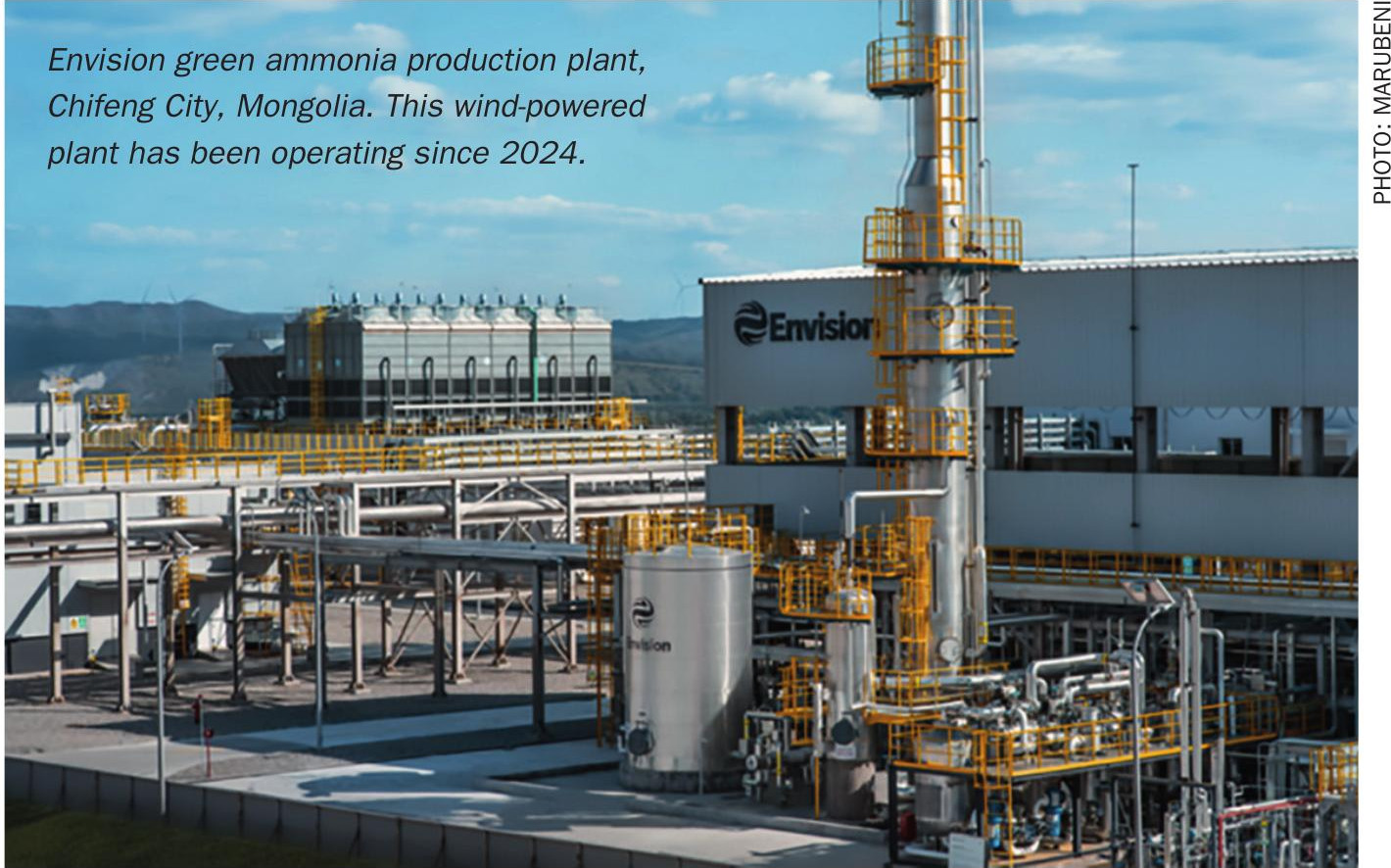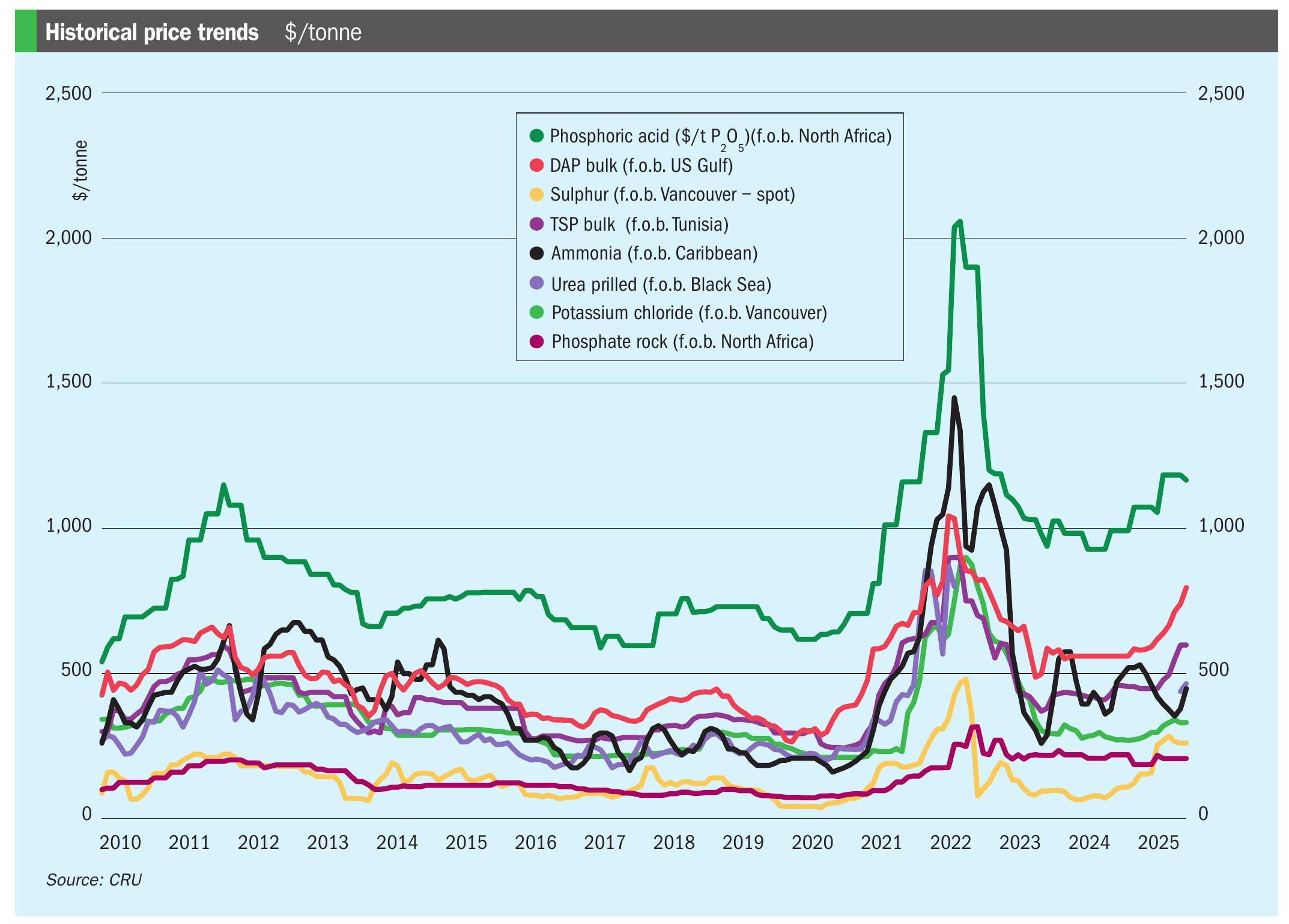Fertilizer International 504 Sept-Oct 2021

30 September 2021
Developing the Woodsmith mine
PROJECT REPORT
Developing the Woodsmith mine
Anglo American is developing the Woodsmith project in northeast England. This will access the world’s largest known deposit of polyhalite, a natural mineral fertilizer containing potassium, sulphur, magnesium and calcium – four of the six nutrients that every plant needs to grow.


Woodsmith mine project
Anglo American gained control of the UK-based Woodsmith project in March 2020 through the cash purchase of Sirius Minerals for $496 million (£405 million). Once developed, the Wood-smith project will mine the world’s largest known source of high-grade polyhalite.
The under-construction Woodsmith mine is located around five kilometres south of Whitby, a small fishing port on England’s North Sea coast. The mine will access and extract polyhalite from a deeply buried underground ore deposit – containing 290 million tonnes of permitted reserves – via two 1.6-kilometre-deep shafts. Unusually, the ore extracted at the mine will then be transported to the port of Teesside through a 37-kilometre-long underground tunnel on a conveyor belt system. This mineral transport system (MTS) is designed to minimise the project’s surface environmental impact.
On arrival at Teesside, polyhalite ore will be granulated at a materials handling facility to produce a premium-quality, low-carbon fertilizer certified for organic use. This product, known as POLY4, will be exported from the company’s dedicated port facility to a network of overseas customers.
Once complete, the Woodsmith mine is expected to produce up to 10 million t/a of POLY4. The timeline for the project’s development is, however, currently under review.
Project progress
Anglo American provided a progress update on the Woodsmith mine project at the end of July, as part of its interim results announcement to the London Stock Exchange. Project development has continued apace in 2021, according to Anglo American, with capital expenditure of $279 million invested during the first half of the year.
The westwards excavation of the MTS conveyor tunnel from Wilton passed the 15-kilometre mark at the end of June, some distance beyond the intermediate shaft location at Lockwood Beck. The sinking of the intermediate shaft at Lockwood Beck is also now complete, having reached the target depth of 383 metres, allowing shaft lining to now commence. At the main Woodsmith mine head, boring of the service shaft has started, with Anglo American also reporting good progress on installation of production shaft infrastructure.
Expected capital expenditure on the Woodsmith project for 2021 is unchanged at around $0.5 billion. Investment is expected to increase further once a detailed review of the project’s development plan is completed. This review will optimise the project as well as ensure it is properly aligned with Anglo American’s technical and other standards.
The outcome of the review – together with finalisation of the mine’s design and project timings – is expected by the end of the year. It will also include the final capital and schedule estimates for the project. Anglo American has already indicated that investment in additional ventilation is likely to be brought forward to increase early production flexibility. The review is also scrutinising the detailed scheduling of the two main shaft installations.
Marketing update
An impressive range of supply agreements for the polyhalite product POLY4 – with well-established trading companies and fertilizer producers such as Archer Daniels Midland Company, BayWa AG, Cibra, IFFCO and Wilmar Group – are already in place globally. The pricing of many of these agreements is benchmarked against the market prices of the underlying key nutrients within POLY4.

The Woodsmith Mine: moving towards a cleaner, greener and more sustainable future
In an exclusive interview, Dr Alexander Schmitt, Chief Marketing Officer at Anglo American Crop Nutrients talks to Fertilizer International about the latest developments at the under-construction Woodsmith mine in the UK and the company’s plans for its polyhalite product POLY4.
Anglo American purchased Sirius Minerals for $496 million in March last year. Could you explain a little more about the rationale behind the purchase of Sirius and the timing of Anglo’s re-entry into the fertilizer market?
Anglo American’s strategy is to own and operate a diversified portfolio of high quality and long life assets producing future-enabling metals and minerals that are essential to decarbonisation and meet consumer demand trends. Our products are helping the world move towards a cleaner, greener and more sustainable future. The Woodsmith project fits perfectly with that strategy.
The world needs to grow more food, more sustainably, from less land to meet the needs of its expanding population – 60 percent more food by 2050. Finding more effective, efficient and environmentally friendly fertilizers will be a crucial way of doing that and POLY4 ticks all those boxes: it delivers higher crop yields while also improving farming’s impact on the environment, not least by having a very low carbon footprint – 85 percent lower than most chemical fertilizers in fact.
Finally, the Woodsmith project embodies Anglo American’s purpose: that is, to reimagine mining to improve people’s lives. It is an opportunity to showcase how Anglo American is working to make a cleaner, greener and more sustainable future a reality, through the creation of an ultra-low environmental impact mine and product, with benefits for local communities, customers and the world at large.
In weighing up the purchase, how important to Anglo American were factors such as the scale of the polyhalite resource and the fact that the project had already entered the construction phase?
The size and quality of the deposit and the sustainable mine design fits perfectly with Anglo American’s goal of securing access to the best resources and operating these assets more effectively and more efficiently than our competitors. We expect to be extracting polyhalite for the long term, generating almost no waste product, and shipping it from a port less than 30 miles away, and with a product that meets today’s and future needs of farmers and food consumers – that sort of asset doesn’t come along very often.
The fact that the project was already established, with a clear design and pathway to production was obviously an attraction also, helping to reduce some risks that can affect greenfield development projects.
There’s also the human element here. Is it true to say that Anglo American has placed great value on the professional competencies of existing staff, and on the leadership and successful track record of the original Sirius management team – given that this has remained largely intact?
The human element is hugely important to me personally and Anglo American as a whole. I am proud to now be part of that Anglo American Crop Nutrients leadership team and, yes, my colleagues who were here during the Sirius ownership deserve great credit for what they achieved: identifying, securing and developing an asset like this took remarkable vision, innovation, perseverance and determination.
For me in my role as heading our sales & marketing team, the most important element to maintain was the customer relationships. Before this role, I was part of Anglo American’s marketing business leadership team, helping to transform businesses and teams to understand and fulfil customer needs through our offerings. So, I really understand and value the importance of human relationships and trust in making business happen – the team must have been doing something right to have secured a peak of over 10 million tonnes a year of orders for a relatively new product that is not yet widely available.

Now it’s important to build on that strong foundation with Anglo American’s industry-leading operational and marketing expertise: we can introduce a number of our FutureSmart Mining™ technologies to the project and provide the global reach to further develop markets for POLY4, “Our thereby providing additional reassurance to our customers.
“Our products are helping the world move towards a cleaner, greener and more sustainable future. The Woodsmith project fits perfectly with that strategy.”
How is the Woodsmith mine project progressing?
Construction during a pandemic must have thrown up many challenges.
Covid-19 has thrown up challenges for everyone across the globe and we’re no different. Despite this, progress has been good. Excavation of the conveyor tunnel had passed 15 kilometres at the end of June, beyond the intermediate shaft location at Lockwood Beck.
At Lockwood Beck, shaft sinking is complete, having reached the target depth of 383 metres, and shaft lining is under way. At the mine head, shaft boring has started in the services shaft, while good progress is also being made on the production shaft infrastructure. We’re all incredibly proud of how the whole team has pulled together to progress the project in such unprecedented circumstances.
Expected capital expenditure in 2021 is unchanged at circa $0.5 billion, while the detailed technical review of the project’s development plan is completed, with the objectives of optimising the project and aligning it with Anglo American’s technical and other standards. The review and subsequent finalisation of design and timing are expected to be complete by the end of the year, including final capital and schedule estimates.
Anglo American has a disciplined approach to capital allocation so that we can deliver consistent returns for shareholders, and this year’s capital allocation shows the strength of commitment from the Group to the project. With our Quellaveco copper mine in Peru – one of the company’s other major development projects – due to come online in 2022, the timing is perfect for Woodsmith as its capital requirements increase over the next few years.
Looking further ahead, when is the outcome of the ongoing technical review of the project’s development plan due – and what are the main objectives behind that?
The technical review is an assessment to ensure the development proceeds and is delivered according to Anglo American’s exacting safety, environmental and technical standards. We expect to complete this work later this year and be in a position to set out the final development budget and schedule in February 2022.
We know our customers are eager to start using POLY4 and we want to make sure we can deliver it as quickly, safely and as reliably as possible for many years to come. We’re looking at this as a long-term investment that can produce healthy margins for Anglo American for several decades – so it’s important to spend some time now getting the engineering and development plan right.
Your role, Alex, encompasses the marketing of Anglo American’s polyhalite product POLY4. How have sales and marketing activities progressed over the last 18 months under Anglo American ownership?
For sure it’s been a key feature, and an essential one for our customer support activities. At the start of the project, long before Anglo American became involved, the objective was to prove the concept and demonstrate the effectiveness of POLY4 as a crop nutrition product.
The team achieved that and more: we consistently demonstrated the real world contribution to better farm yields, crop quality and various other needs of farmers like disease resistance and soil quality. The offtake agreements are a testament to the strength of that marketing, plus the agronomic work, and the confidence that our customers have in the product.
Now the research has moved on into full-scale commercial trials: we’re up to around 550 on-farm commercial demonstrations, adding to the 600 research trials we’ve already done. The aim is to assess how POLY4 fits best in customer portfolios and where it can achieve most value for farmers, so that we can market it effectively.
In South America, for example, it will find a role as a substitute feedstock for major blends, replacing some – but not all – potassium, sulphur and calcium inputs, while increasing the overall nutrient content of that blend (with MgO and micronutrients) and reducing its chloride content. Our 2020 commercial trials on Brazilian soybeans have shown that POLY4 inclusion in a typical 0:18:18 blend can give a four percent yield improvement over standard practice.
In Europe, it will generate most interest as an environmentally friendly and organically-certified straight or NPK feedstock to aid more sustainable farming practices. The EU has set some ambitious environmental targets for farmers: a 50 percent reduction in nutrient losses while maintaining soil fertility; 25 percent of farmland to be organic by 2030; reductions in nitrogen and phosphorous fertilizer use, etc.
POLY4 can help because it increases overall nutrient use efficiency with more balanced nutrition. It improves soil health, crop quality and weather resilience – and has a very low carbon footprint.
Farmers are trying to improve the productivity and sustainability of their land. So they will use POLY4 as part of a high-performance package combined with other traditional fertilizer products, as a way of providing their crops with a broader range of efficient nutrients than they are currently able to easily and affordably access. Our marketing is about working with our customers to get that message down to the farmgate, so that farmers understand it as a solution to their needs.
Innovative mine design
The Woodsmith mine’s innovative design – by allowing most operations to take place unobserved underground – was key to the project gaining planning consent in 2015 (Fertilizer International 481, p56).
To accomplish this, the mine incorporates very large diameter foreshafts near to the surface. These cavernous structures are designed to house and conceal the mine’s bulky winding gear and associated equipment. Narrower diameter vertical production and service shafts lead off from these large near-surface chambers. These, in turn, connect to the horizontal mineral transport system (MTS) tunnel (Figure 1).
Initially, the production and the service shafts extend from surface level to a depth of 60 metres as 36 metre diameter chambers. From that depth, they extend downwards as nine metre diameter shafts to the polyhalite seam 1.5 kilometre below ground.
A third shallower MTS shaft is being sunk at the Woodsmith site to enable a tunnel boring machine (TBM) to be lowered and launched. This will be used to drive one section of the 37-kilometre-long MTS tunnel northwards from the Woodsmith site towards the Lockwood Beck intermediate shaft (Figure 1). The MTS will be used for horizontal transport of polyhalite ore from the mine to Teesside. It intersects and connects to the production and service shafts at a depth of 360 metres.
The project is using a variety of rock boring and shaft sinking techniques. Notably, the Woodsmith mine features the deepest diaphragm walls ever constructed in the UK – down to 120 metres in the case of the service and production shafts. The project will also be the first in the UK to use a Herrenknecht vertical shaft sinking machine (VSM)1 .
Bauer began the diaphragm walling in 2018. The scope of its work included the initial 120-metre-deep section of the production shaft, together with completion of the diaphragm walling on the near-surface sections of all three mine shafts. Similarly, contractor Careys extended the initial 120-metre-deep section of the service shaft, this time using conventional sinking segmental lining coupled to a slipform secondary lining1 .
The production and service shafts will now be taken to their full 1.5-kilometre depths using two Herrenknecht shaft boring roadheaders. These were delivered on site in 2020 and the first machine was launched this summer. Careys, meanwhile, extended the MTS shaft to a depth of 120 metres using the Herrenknecht VSM. A Galloway frame will now sink the MTS shaft to its full 360 metre depth using a conventional drill and blast method1 .
At the project’s Teesside end, tunnelling contractor Strabag is using a Herrenknecht TBM to drive the first section of the MTS tunnel southwards from Wilton to the Lockwood Beck intermediate shaft. This TBM began work in April 2019 and, subsequently, has advanced well ahead of schedule. Strabag expected to remove a massive 400,000 m3 of material from the first 12 kilometres of the tunnel drive. Better than expected ground conditions have enabled this TBM to be refurbished and reused to complete the second 12-kilometre tunnel drive. This approach has cut project costs by reducing the size of the cavern needed at Lockwood Beck and using the infrastructure already installed at Wilton1 .
The Lockwood Beck intermediate shaft is located around 32 kilometres east of the main Woodsmith mine site. It is constructed within a secant piled wall to a depth of 20 metres. A grout curtain installed by Bachy Soletanche leads on from this to a depth of 160 metres. Strabag excavated the shaft to its full 380 metre depth in August this year using a blind boring method.

Currently, the project’s marketing activities are concentrating on the development and implementation of detailed regional-level sales and marketing strategies. To further promote POLY4 to end-users, additional support is also being provided to help customers with their own market development activities.
The number of commercial-scale on-farm demonstrations has accelerated, with around 550 either in progress currently or complete. These demonstrations continue to validate the product’s agronomic efficacy and the potential improvements in crop yield and/or quality it can deliver to farmers (Fertilizer International 502, p46).
Additional studies have also shown the ability of POLY4 to enhance soil health by increasing resilience to compaction, erosion and run-off. This is addition to improvements in nutrient availability to crops, with a corresponding reduction in excess nutrients entering watercourses. POLY4 is certified for organic use and, according to Anglo American, generates up to 85 percent less carbon emissions thanks to a production method that generates little to no waste.
Delivering on jobs
In its latest update, Anglo American revealed that 1,300 people are now employed full time in the construction of the Woodsmith mine, up from 1,000 at the end of last year. The company is also set to hire more than a dozen local apprentices to add to the 14 already employed on the project. Hundreds more contractors and local companies are also beneficiaries of the project’s supply chain expenditure.
Commenting in July on project progress, Chris Fraser, CEO of Anglo American’s Crop Nutrients business, said: “The first half of the year hasn’t been without its difficulties for everyone, not least because of the ongoing restrictions that we’ve been working with during the pandemic. But I am incredibly proud that the whole team has pulled together and that we’re continuing to provide important opportunities for people in the region.”
He added: “We’re determined to provide as many jobs for local people as we can and build a long-term local workforce – our apprenticeship programme is testament to that.”
So far this year, Anglo America has provided £150,000 to support local organisations in North Yorkshire and Teesside. The money forms part of a £300,000 regional social & economic development plan. This is designed to help increase employment opportunities and raise aspirations in the region. Additionally, the project’s charitable foundation has donated more than £236,000 to good causes. This includes more than £125,000 in Covid-19 recovery funding, as well as significant donations to food banks and other emergency food supplies during the pandemic.
“We continue to identify ways in which we can help and support people, business and organisations in the areas around our operations,” said Chris Fraser. “Anglo American is committed to the area for the long term and is determined to make a positive impact on the health and wellbeing of our communities, as well as the local environment.”
Reference






